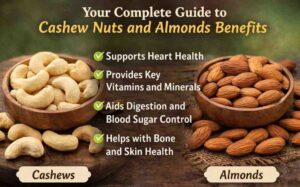
Almonds: A Complete Guide to the Ultimate Super Nut

People have loved almonds for hundreds of years because they are among the healthiest and most useful nuts. Almonds are excellent for you whether you eat them raw, roasted, or in various foods. People often refer to them as “super nut” due to their abundance of essential healthy fats, vitamins, and minerals. We will discuss the health benefits, nutritional value, and different ways to eat almonds in this blog.
Nutritional Value of Almonds
Almonds are a powerhouse of nutrients, offering a perfect balance of protein, healthy fats, fibre, and essential vitamins. A one ounce (28g) serving of almonds contains:
- Calories: 160
- Protein: 6g
- Healthy Fats: 14g (including monounsaturated and polyunsaturated fats)
- Fibre: 3.5g
- Vitamin E: 37% of the Daily Value (DV)
- Magnesium: 20% of the DV
- Calcium: 8% of the DV
- Antioxidants: High levels, particularly in almond skin
These nutrients contribute to various aspects of health, making almonds a valuable addition to any diet.
Health Benefits of Almonds
1. Promotes Heart Health
Due to the high amount of polyunsaturated fats in almonds, good cholesterol (HDL) levels rise, and bad cholesterol (LDL) amounts fall. It makes getting heart disease less likely. The high amount of vitamin E also works as an antioxidant to protect cells from oxidative damage.
2. Aids in Weight Management
Even though they are high in calories, almonds are a healthy snack that can help you keep your weight in check. When you eat fibre and protein, you feel full for longer. This process makes you less hungry and helps you control how many calories you eat.
3. Supports Brain Function
L-carnitine and riboflavin, which are important for brain health, are found in almonds. Regular drinking might help keep your brain healthy and improve your memory.
4. Regulates Blood Sugar Levels
The magnesium in almonds helps regulate blood sugar levels, making them beneficial for individuals with diabetes. Studies suggest that consuming almonds can improve insulin sensitivity and reduce the risk of type 2 diabetes.
5. Strengthens Bones
Almonds are a good source of calcium, magnesium, and phosphorus, all of which contribute to strong and healthy bones. Regular consumption may help prevent osteoporosis and improve bone density.
6. Boosts Skin and Hair Health
Almonds have antioxidants and vitamin E that help fight the signs of aging, keep skin moist, and shield it from UV damage. Many people use almond oil to strengthen their hair, make it shine, and calm itchy scalps.
Ways to Include Almonds in Your Diet
You can enjoy almonds in various ways, making them easy to incorporate into your daily diet. Here are some ideas:
- Raw or Roasted: A handful of almonds makes for a healthy snack.
- Almond Butter: Spread on toast or mixed into smoothies.
- Almond Milk: A dairy-free alternative for coffee, cereals, and smoothies.
- Almond Flour: Used in gluten-free baking for cakes, cookies, and bread.
- Toppings: Add sliced almonds to salads, yogurt, or oatmeal.
- Almond-Based Desserts: Use in energy bars, granola, or homemade nut-based sweets.
Choosing the Right Almond
Choose organic and raw almonds to prevent unnecessary additives. If you buy roasted almonds, be sure they are dry-roasted and free of extra salt or sugar. To keep almonds fresh, store them in an airtight container in a cool, dark place.
Conclusion
Almonds are the ultimate superfood, providing a plethora of nutritional advantages for heart health, brain function, weight management, and more. With their variety and delicious flavor, almonds are an excellent supplement to any diet. Whether taken as a snack, mixed into smoothies, or cooked, almonds are an effortless and delightful approach to improve general health. Begin adding almonds into your everyday routine and get the many benefits they provide!
Our PrimeNuts Products



